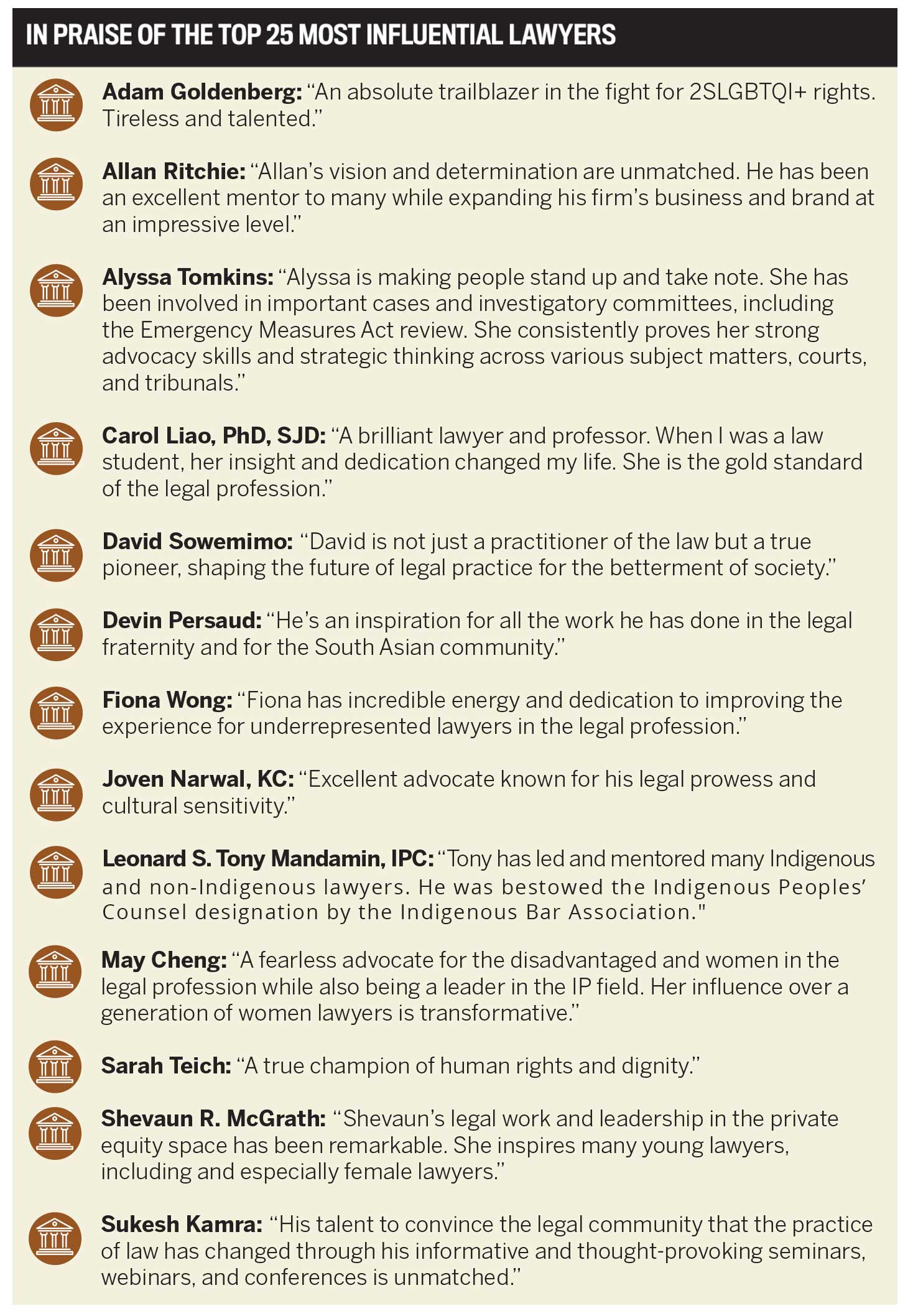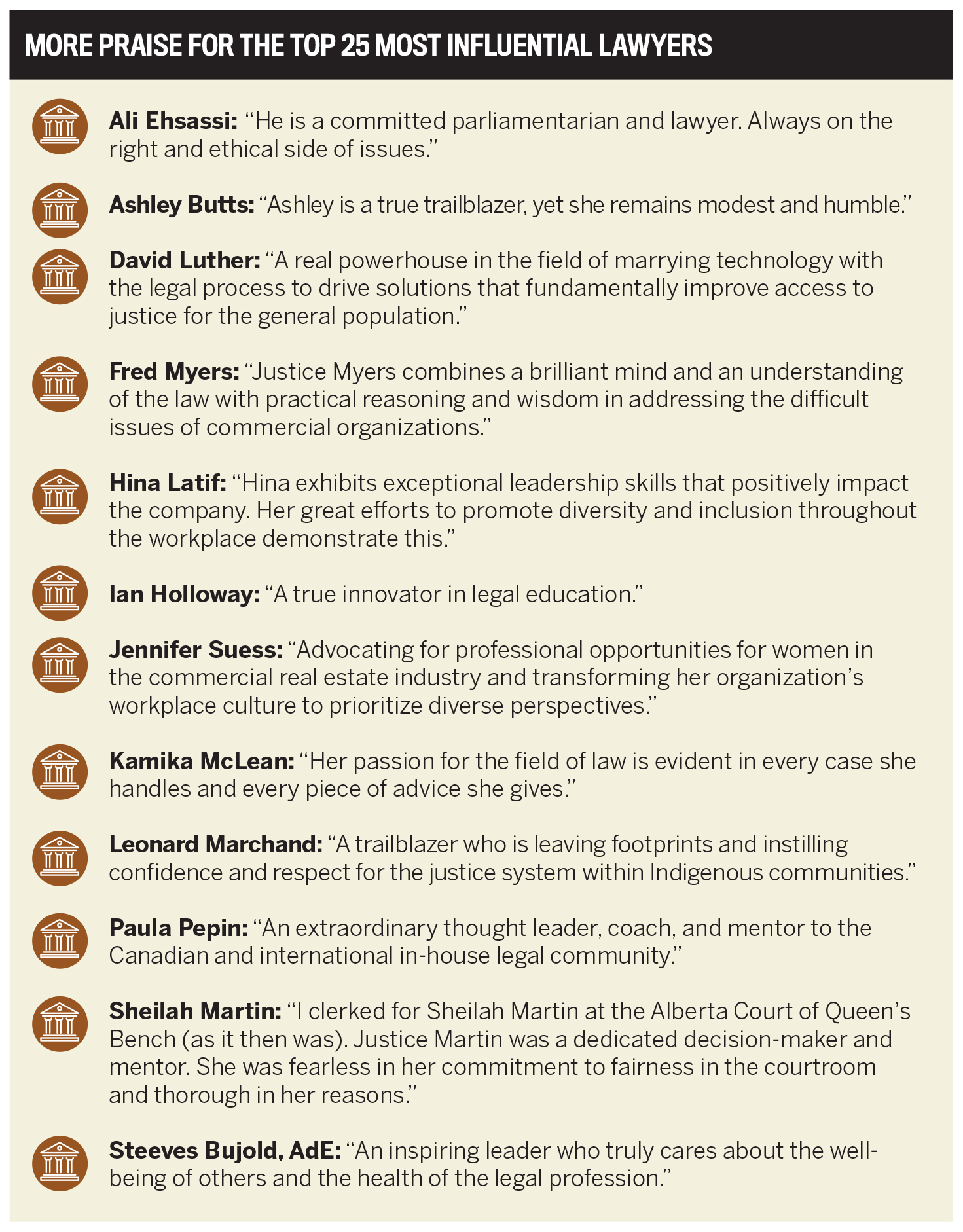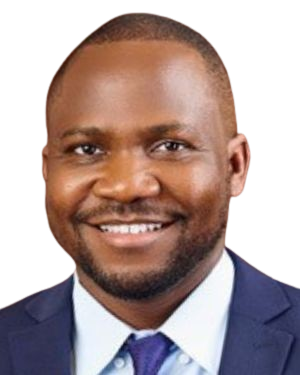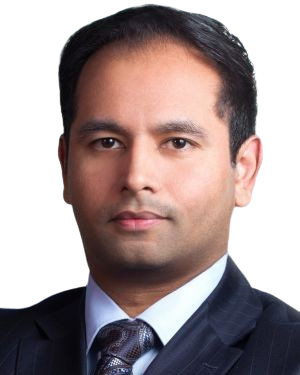

Jump to winners | Jump to methodology
The 15th edition of Canadian Lawyer’s Top 25 Most Influential Lawyers celebrates the most deserving legal professionals making immense contributions nationwide through their leadership in 2024.
From a qualified nominee pool of 114 and 12,647 votes cast, the publication’s rigorous selection process revealed a profound truth. There isn’t a single set of qualities that will make a lawyer influential in Canada in 2024, and multiple paths can lead to significant influence in Canadian law.
“What strikes me about the people who end up on the list is that they’re a uniquely diverse group doing exceptional work in many fields and from many platforms,” says Janice Rubin, a former Most Influential Lawyer award winner and partner at Rubin Thomlinson LPP, whose valuable input helped choose this year’s honorees as a member of CL’s editorial panel.

As in years past, readers’ votes of support determined a short list of candidates presented to editorial board members tasked with casting a vote for a maximum of five winners who demonstrated extraordinary impact within the past 18 months in their respective categories:
changemakers
human rights, advocacy, and criminal law
business
in-house
government, non-profits, associations, and judiciary
Regarding the nominations for CL’s most influential lawyer list, Rubin points out the genuine and sustained annual interest and participation within the country’s legal community.

Veteran editorial board member Lorne O’Reilly, lead counsel at Dow Canada, emphasizes that it’s essential to recognize the people who do make their mark.
He notes that, at its base, the winners’ leadership skills are the foundation for influence, along with:
expertise, knowledge, and reputation
innovation and idea advocacy
presence and style
involvement in causes
being thought leaders and doers
“Each year, there is consistency in quality and contributions,” he says. “The influential lawyers are impacting national issues, contributing to education and mentorship, leading on ethics initiatives, engaging in ongoing teaching and training, and giving back, which has tremendous value.”
Recent statistics from IBISWorld highlight Canada’s substantial legal community and how those recognized as influential have distinguished themselves from a vast pool of peers.
There were 33,855 law firm businesses as of 2023, a 0.2 percent decline from 2022.
The number of businesses providing services as law firms in Canada decreased 0.2 percent per year on average over the five years between 2018 and 2023.
Canada’s 14 provincial and territorial law societies govern over 136,000 lawyers, Quebec’s 4,200 notaries, and Ontario’s 10,600 independent paralegals in the public interest.
As of April 2023, there were 57,000 lawyers and 11,000 paralegals in Ontario.
At age 17, Sowemimo emigrated from Nigeria as an international student to attend the University of Manitoba. He arrived alone, and now, as a parent of two children, he wonders how his father must have felt letting him go.
“I had to figure things out by myself and learn how to stand up and advocate for myself in schooling and employment,” he says. “I think all those experiences brought me to where I am today. I’m advocating passionately for my client, but also trying to objectively see the legal and factual issues so as not to expose them to unnecessary costs.”
For eight years, the civil litigation lawyer has been fiercely advocating for victims of serious and catastrophic personal injuries, who often lack a voice against large insurance companies.
His prior experience working as an adjuster at a major insurance company gave him a unique perspective of assessing a case objectively and finding the path to obtaining the best client outcome.


Sowemimo’s early days establishing himself in Winnipeg were critical to shaping how he practices law at his boutique firm in Edmonton, AB, and what he has subsequently achieved:
Founding the David Sowemimo Law Entrance Scholarship at the University of Manitoba, a first-of-its-kind $6,000 annual award to encourage Black students to choose law
Being honoured as a Leading Lawyer to Watch in the 2024 Canadian Lexpert Directory
Getting involved in police oversight to ensure marginalized people’s voices are included in discussions relating to policing, serving as a commissioner on the Edmonton Police Commission and chair of the Professional Standards Committee
When not working tirelessly to achieve settlements for his clients through the Alberta Court of King’s Bench court process and alternative dispute resolutions, Sowemimo is making a difference for Black law students at his alma mater, emphasizing diversity and representation within the legal profession.
“I’m happy and humbled when I meet students whom the scholarship has impacted and they are pursuing their dreams,” he says. “It gives me a lot of joy because I remember those days when I was trying to go to law school, and I just didn’t see how I could do it financially.”
Sowemimo also draws on his personal and lived experiences to bring the concerns of marginalized and racialized people to the police service, paving the way for more positive relationships.
One mentor from his articling days influenced Sowemimo’s perspective on serving clients and helping them successfully navigate a complex legal system. Norm Assiff, founder of the award-winning personal injury firm Assiff Law in Edmonton, taught him the importance of personalizing client interactions with face-to-face meetings.
“We drove the three-hour trip to Calgary from Edmonton during my first week as an articling student, and he told me that it only takes one file to destroy all the good work you’ve done,” Sowemimo recalls. “He said, ‘You’ve got to give 100 percent to every file,’ which has stayed with me.”
Grounded in her Jewish identity and deeply affected by the stories of family members killed in Holocaust concentration camps, Teich realized early on that she wanted to do everything she could to stop mass atrocities.
She committed herself to mitigating the damage and serving the victims through her legal career.
“Knowing that a quarter of my family was murdered in the Holocaust was very impactful when I was growing up in terms of deciding what I wanted to do with my life. It affects how I approach life and work,” she says.


Teich’s passion, drive, and unwavering resolve in defending human rights, bringing global issues to the forefront of legal and public discourse, and influencing public policy resulted in several notable achievements:
As Human Rights Coalition convener representing eight Canadian diaspora communities, Teich obtained full standing in the Foreign Interference Commission for the group and has actively participated in the Commission’s proceedings; second-stage hearings are slated to proceed in the fall of 2024.
Filed a complaint with the Canadian Ombudsperson for Responsible Enterprise (CORE) in April 2022 about 14 companies using Uyghur forced labour. This action led to the CORE’s first-ever investigations. As lead counsel for the Uyghur Rights Advocacy Project and 27 other non-profit organizations, she secured a significant rebuke and recommendations in the first report on Dynasty Gold Corp.
In January 2023, filed a complaint to the UN Committee on the Rights of the Child on behalf of Yusuf Sayin, a young boy with advanced-stage cancer whose mother was arbitrarily detained in Türkiye. This relentless advocacy led to new Turkish legislation allowing temporary releases for mothers of ill children, enabling Yusuf to spend his final days with his mother.
The Yusuf Sayin case hit close to home for Teich, who was undergoing chemotherapy for metastatic breast cancer, a diagnosis she received two years ago at age 30. At the time, her mother accompanied her to each appointment for comfort and support.
“I asked to be involved with this case because it resonated with me,” Teich says. “I remember talking to the non-profit worker who was case handling and saying I can’t imagine a child not having their mother while going through this kind of thing.”
Two significant mentors have inspired Teich to persevere against all odds: Human Rights Action Group (HRAG) co-founder David Matas and Daniel Eisen, co-founder of Secure Canada (formerly known as the Canadian Coalition Against Terror), who serves on the HRAG board. Secure Canada collaborates on various projects with HRAG.
“David’s mentorship has taught me so much. He says the wheels of justice grind slowly but inexorably, and I love that quote. It is motivating and accurate because many of these files can take years. The point is to be resilient, not give up, and have faith that justice will eventually be attainable,” she says. “Daniel taught me some valuable lessons, such as the importance of thinking creatively and outside the box.”
The legal leader’s approach to law has evolved significantly over his career. Notably, Ritchie’s exceptional leadership emerged when he became aware that his single-minded focus, which had driven early success, hindered his growth.
“I realized that the biggest thing I could do is try to understand the people working alongside me and their needs and interests, to create an environment where they are happy, engaged, and able to perform at their best,” he says.
Ritchie’s vision and collaborative approach resulted in the firm’s eighth year of record revenue growth in 2023.


He has successfully guided Loopstra Nixon through its transformation into a market-leading modern law firm, accomplishing the following:
Enabling the firm to grow from 40 to 115 lawyers, expanding from a single office to six offices in Ontario, two satellite offices in New York City and Buffalo, with additional acquisitions in the works for 2024.
Led the integration of 22 lawyers and over 50 professionals from Macdonald Sager LLP and five lawyers and 10 professionals from Feige Nawrocki LLP in Toronto’s largest law firm combination in over a decade.
Receiving the Adjunct Professor of the Year award in 2023 at TMU Law School, where he teaches courses on corporate law, finance, and the innovative Business of Lawyering, which delves into law firm management, culture, law firm economics, mental health, EDI, and career management.
Outside his firm, Ritchie takes great pride in helping young lawyers navigate the first few critical years through the Business of Lawyering course he developed.
“After teaching the class for four years, I’m seeing students who are now in their first and second years as associates within firms,” he says. “The class has aged well, and they’re beginning to have key insights hit home. This is my most meaningful impact within the profession, helping each cohort gain foresight and make their early law firm experience more enjoyable and rewarding.”
Ritchie’s strategic vision, business acumen, and boundless energy stand the law firm in good stead for future prosperity. Since taking the helm in 2017, he has brought in a top-tier professional management team that he empowers.
“I’ve created a zone of safety for them to make little missteps and push their limits,” he says. “This allows the team to be more creative, leading them to do things differently than traditional law firms, and that has attracted talent and clients because we have a different vibe and approach to the marketplace.”
He emphasizes that he views everyone as a potential mentor or role model.
“I tend to think of myself as being situated within a community of mentors, and if you wake up every day and be helpful, genuine, and honest with these people, you end up with this self-reinforcing circle of mentorship and trust,” he adds.
A desire to realize his father’s unfulfilled dream of becoming a lawyer in Canada spurred Narwal to begin his journey, leading to his prominence as a trial and appellate lawyer. He handles high-stakes criminal and securities litigation cases, professional regulation, and complex civil matters with criminal aspects from his Vancouver office.
“My father came to Canada in 1976. He was a lawyer in Hoshiarpur, Punjab, but at the time, there was no mechanism by which to have his Indian law degree recognized,” he says. “He eventually became one of the first Punjabi-origin notaries public in British Columbia. His office was in the Punjabi Market in South Vancouver, where he and my mother worked together.”
Narwal tethers his approach to law and his career to the experiences of his father, grandfather, and great-grandfather, which began in 1906 when his great-grandfather arrived in BC.
Inspired by the Ghadar movement, Narwal’s great-grandfather returned to Punjab to fight against British rule and became one of five Jathedars of the Babbar-Akali independence movement. He served six years in British jails for various political offences.


His grandfather came to BC when he was 13, possibly becoming the province’s first Punjabi-Sikh union delegate. In the 1950s, he led a delegation to Ottawa for high-level political meetings to advocate for the easing of racist immigration restrictions.
“The narratives of resistance and resilience in my family history laid the foundations for my perspectives and, ultimately, the type of practice I have built, which involves representing individuals and entities against the awe-inspiring machinery of the state and its institutions,” says Narwal.
One of his peers notes, “Joven does outstanding work protecting individuals’ rights and freedoms. On top of this, he is one of the kindest, most compassionate, intelligent, and tenacious people I have known.”
Narwal has made significant impacts in and outside the courtroom, including:
For over 12 years, serving as an adjunct professor at the University of British Columbia’s Allard School of Law while mentoring students and young lawyers
Co-edited the Criminal Law E-Book published by the CanLII in February 2023
Obtained 18 reported decisions over the preceding 18 months from the BC Court of Appeal, Nova Scotia Court of Appeal, BC Supreme Court, Nova Scotia Supreme Court, and Law Society of British Columbia
Served as the first BIPOC president of the Vancouver Bar Association in its over 126-year history; honoured with the Hands Against Racism Award in 2024
“The most meaningful work I have done in my career has been defending over 100 lawyers before the Law Society in investigations and hearings,” he says.
Growing up in the Golden Age of the Punjabi Market in the 1980s and 1990s, Narwal recalls it was also a period of moral panic in which Indo-Canadian citizens were vilified for extremism and gang violence, and were subjected to unfair police treatment.
He distinctly remembers the reverence and respect with which the names of lawyers involved in those cases would be mentioned.
Canadian Lawyer called for nominations between March 25 and April 19 from legal groups, readers, and our panel of writers and editors. Qualifying nominees were then included in a reader survey in the following areas: changemakers; human rights, advocacy, and criminal law; business; in-house; and government, non-profits, associations, and judiciary.
Based on the reader survey results, a short list of nominees was then sent to our Editorial Board members to vote for a maximum of five winners in each category.
The board was asked to select winners who had most significantly influenced the legal system over the last 18 months.